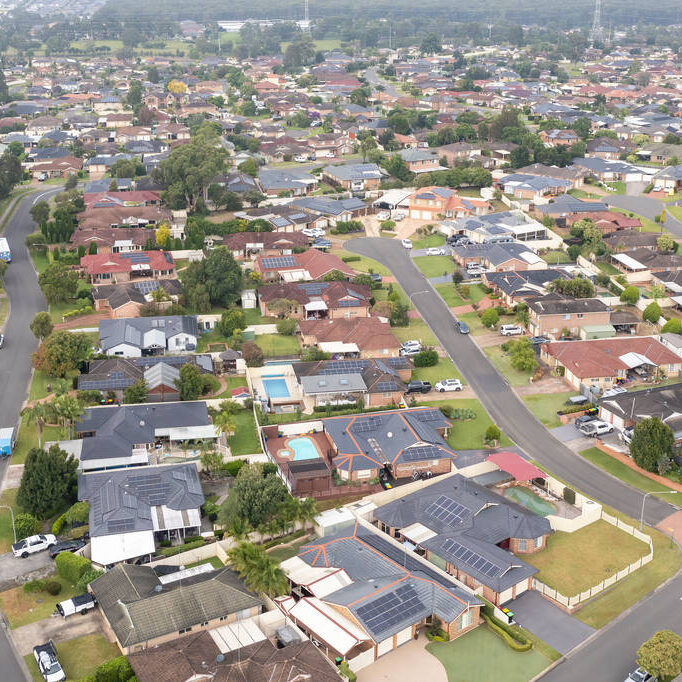You may be chasing more affordable prices, dreaming of a lifestyle change, or spotting investment potential in a different market altogether. No matter the reason, buying property in another state can be pretty tempting. But let’s be clear: buying interstate isn’t quite the same as finding a place down the road. You may have to […]
Your Guide to a Home Loan Top Up
Need extra cash to buy a car, renovate your kitchen or fund any other expense? If you’ve been chipping away at your home loan, it’s worth checking to see if there’s equity in your property you can use for a home loan top up. It might be better than swiping your credit card or taking out a personal loan. But before you jump in, spend ample time understanding all the good and bad of this financing option. Here’s our ultimate guide to a home loan top up, covering the essential things you must know.
What Is a Home Loan Top Up and How Does It Work?
A home loan top up, also known as a loan increase or equity loan, is a way to borrow additional funds using the equity you’ve built in your property. Think of it as an extension of your existing mortgage, allowing you to access more money without the need to apply for a separate loan or deal with an entirely different interest rate.
Here’s how it works in practice:
Say you purchased a home for $500,000 five years ago with a $400,000 mortgage. Over time, you’ve paid down $50,000 of the principal, and your property has appreciated in value to $600,000. Your current loan balance is $350,000, but you have $250,000 in equity ($600,000 property value minus $350,000 loan balance).
If you need $50,000 for home renovations, you can top up your mortgage to $400,000 instead of using a line of credit or taking out a personal loan. This gives you access to the $50,000 you need while leaving you with $200,000 in equity.
Home Loan Repayments After a Top Up
When you top up your home loan, your repayments will typically increase to cover the additional amount borrowed. However, the structure of these repayments can vary depending on your lender and the terms of your top up.
In most cases, the top up amount is simply added to your existing loan balance, and your repayment schedule is recalculated based on the new total loan amount and your remaining loan term. This means you’ll have one single, larger repayment rather than separate payments for your original loan and the top up amount.
For example, if your original monthly repayment was $2,000 on a $350,000 loan, and you top up by $50,000, your new repayment might increase to $2,300 on the new $400,000 loan balance (exact figures would depend on your interest rate and loan term).
Some lenders may offer the option to treat the top up as a separate loan portion with its own term and potentially different interest rate. This can be useful if you want to pay off the top up amount more quickly than your original mortgage.
Home Loan Top Up vs. Refinancing
Is topping up your home loan the same as refinancing? While both allow you to access your equity to gain additional funds, they work differently:
Home Loan Top Up
- Increases your existing loan with your current lender
- Generally quicker and involves less paperwork
- Usually incurs fewer fees
- Keeps your existing loan terms (interest rate, features) for the original loan amount; the option to have the top up as a separate loan depends on the lender
Refinancing
- Involves taking out a new loan, often with a different lender
- Can be used to access equity but also to switch to a better interest rate or loan features
- Typically involves more extensive application and approval processes
- May incur more fees (e.g., discharge fees from your old lender, application fees for the new loan)
- Allows you to reassess and potentially improve all aspects of your home loan

Processing Time for Home Loan Top Ups
The processing time for a home loan top up is generally quicker than applying for a new loan or cash-out refinancing. While exact timelines can vary between lenders, you can typically expect the process to take anywhere from a few days to a couple of weeks. Here’s a general timeline:
- Application submission: 1 day
- Initial assessment: 1-3 days
- Property valuation (if required): 2-5 days
- Final approval: 1-3 days
- Funds release: 1-2 days
When Does a Home Loan Top Up Make Sense?
A home loan top up can be the most suitable option in several scenarios:
- Home Renovations: If you plan to add an outdoor kitchen or enhance the look of your living area and bedrooms, a top up can provide the necessary funds at a lower interest rate than most personal loans or credit cards.
- Debt Consolidation: The funds you’ll get from a home loan increase can help pay off high-interest debts like credit cards or personal loans. You can potentially save money on interest and simplify your finances.
- Investment Opportunities: If you’ve identified a promising investment opportunity, a top up can provide the capital you need at a competitive interest rate. You can even buy another property using your equity and a home loan top up.
- Major Purchases: If you need to buy a new car, fund your child’s education or have other significant expenses, consider a home loan top up. It might be more cost-effective than getting auto loans or other dedicated loans.
- Emergency Funds: In cases where you need access to a large sum quickly, a top up can be faster and more convenient than applying for a new loan.
Common Criteria for Home Loan Top Up Applications
Just because you already have a home loan with your current lender doesn’t automatically guarantee you’ll be eligible for a top up. You still need to meet certain requirements. While criteria can differ between lenders, here are some common requirements for a home loan top up:
- Sufficient Equity: You typically need at least 20% equity in your property after the top up to avoid Lenders’ Mortgage Insurance (LMI).
- Good Credit History: Lenders will review your credit score and repayment history. It works in your favour if you haven’t missed any monthly repayment.
- Stable Income: While applying for a home loan increase is quicker than other options, you’ll still need to show you can manage the increased repayments. You might have to submit proof of income and other related documents.
- Loan-to-Value Ratio (LVR): Most lenders cap the LVR at 80-90% after the top up. So, it’s vital to run the numbers to understand your accessible equity, how much you’d like to increase your home loan and how this will affect your LVR.
- Property Valuation: Your lender may require a new valuation of your property to calculate the equity you’ve built into your mortgage accurately.
- Purpose of Funds: Some lenders may ask for details on how you plan to use the additional funds, so make sure you’re ready to answer these questions.
Key Considerations Before Getting a Home Loan Top Up
Before proceeding with a home loan top up, consider the following:
- Interest Costs: While the interest rate may be lower than other forms of credit, you’re potentially paying this interest over a longer period, which could result in higher overall interest costs.
- Loan Term: Consider whether you want to extend your loan term to accommodate the top-up or treat the increase as a separate loan portion to pay it off faster.
- Repayment Capacity: Even if you’ve demonstrated you can manage the higher repayments, it still pays to re-evaluate your financial situation. Ensure you can comfortably manage the increased repayments over the long term.
- Property Value: It doesn’t make sense to top up your home loan when you don’t have much usable equity. So, ensure your property valuation supports the amount you want to borrow.
- Future Plans: Considering selling your property soon? Increasing your loan balance could impact your profits. If that’s the case, you might want to explore other financing options to fund your home extensions or new car.
Summing It Up
A home loan top up can be a flexible and cost-effective way to access additional funds. However, it’s crucial to carefully consider your financial situation and long-term goals before proceeding. As always, it’s advisable to consult with a financial professional to ensure you’re making the best decision for your circumstances.
If you need more help comparing a home loan top up with refinancing and other options, don’t hesitate to reach out. Our experienced mortgage brokers are here to help address your questions, especially if you want to maximise using your equity to buy another property or fund other expenses. Contact us today for a consultation.
Enquire Now
Find Your Perfect Finance Solution
Let's discuss your finance needs. We’re here to help.
More posts from Deltos Finance

Suburbs with the Highest Rental Yield in Tasmania
The term “rental yield” is music to any property investor’s ears. It’s the key metric that indicates the annual return on your investment, essentially the percentage of the property’s value that comes back to you in rental income. In a market like Tasmania, which has been gaining traction for its overall investment appeal, pinpointing the […]

Launceston: A ‘Second Wind’ Property Market You Should Invest in Now
When talk turns to Tasmania’s property scene, it’s easy for the spotlight to shine brightly on Hobart, with its bustling waterfront and historic charm. But just a little further north, nestled at the head of the picturesque Tamar Valley, lies Launceston—a city that quietly hits its stride and presents a compelling proposition for savvy property […]

How Often Does Property Double in Value?
Every homeowner has likely dreamed of their property doubling in value in the future, turning into a valuable nest egg or funding their next big adventure. But how long does it actually take for a property to double in value? And how often does it happen? While there’s no magic eight-ball to predict the property […]

Stamp Duty Exemption for First-Home Buyers in Tasmania: Has It Paid Off?
Purchasing a property has historically come with major financial difficulties, especially for first-home buyers in Tasmania or any other state for that matter. The stamp duty is one of those most notable monetary challenges for homebuyers. Essentially, it’s a tax levied on property purchases that often adds tens of thousands of dollars to upfront costs. […]

Difference Between Airbnb and Traditional Renting in Hobart
Hobart’s property market has become a hotspot for investors largely because of its strong tourism demand and stable rental market. But that doesn’t mean all property investments in this Tasmania capital are a sure win. One factor to consider is deciding between short-term rentals like Airbnb and traditional long-term renting. Each option has distinct advantages […]

Is Launceston a Good Place to Live?
The short answer is yes, especially if you want a more affordable lifestyle without giving up access to key services, natural beauty, and long-term opportunities. Also, with its blend of heritage charm, steady economic growth, and a property market still within reach for many Australians, Launceston, Tasmania, is gaining momentum as a popular area for […]

Hobart Property Management Fees: A Complete Guide
You’ve already secured an investment loan and finalised your rental property purchase in Hobart. Now, it’s time to take action by listing the property for rent and managing it effectively to start generating rental income. But how much should you expect to spend on property management in Hobart, Tasmania? As Tasmania’s capital continues to attract […]

How Rising Property Prices Affect Your Home Loan and Buying Potential
Here’s the good news: the Australian real estate market has been experiencing significant growth in recent years, with house prices in major cities reaching record highs. It can be a huge win for homeowners and investors, especially those planning to sell their properties soon. However, this can be an issue for potential property buyers, including […]

Build Your Wealth with a Simple Guide to Using Your Home Equity
Building wealth requires adopting the right mindset and being strategic when using available financial instruments. Essentially, it’s about making your money work in your favour. But what if you don’t have enough cash to start creating wealth? There’s an underutilised strategy that we want to share with you, and that is leveraging your home’s equity—the […]


